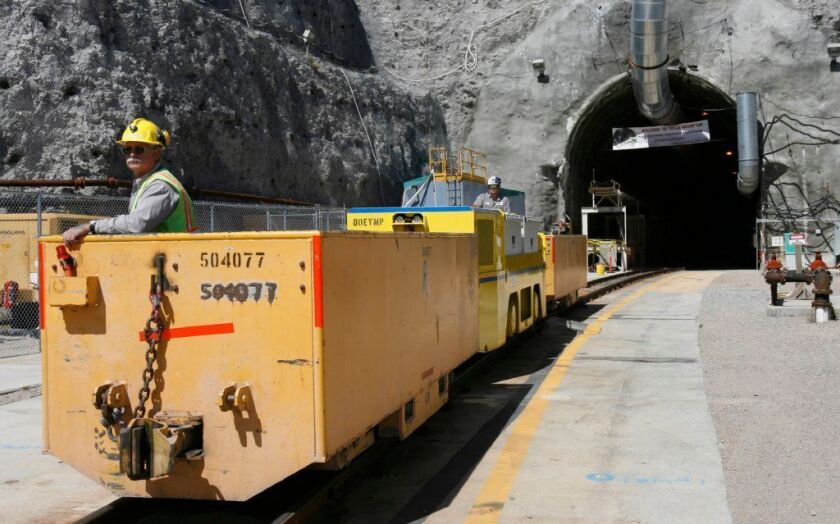“The proposed $3.1 billion increase for weapons is simply sprinting toward failure, and Congress should right-size NNSA’s workload to match what the complex can realistically do,” – Rep. Marcy Kaptur, D-Ohio
ARTICLE BY: ROB NIKOLEWSKI | latimes.com
President Trump has made a U-turn on funding the long-delayed and long-debated Yucca Mountain nuclear waste repository in Nevada — but it’s unclear what his decision means for moving the 3.55 million pounds of spent nuclear fuel at the shuttered San Onofre nuclear power plant.
In a tweet Thursday, Trump wrote:
Nevada, I hear you on Yucca Mountain and my Administration will RESPECT you! Congress and previous Administrations have long failed to find lasting solutions – my Administration is committed to exploring innovative approaches – I’m confident we can get it done!
— Donald J. Trump (@realDonaldTrump) February 6, 2020
A White House official confirmed that the administration will not include any funding for Yucca Mountain when it turns in its proposed 2021 budget next week.
That’s a turnabout from last year when the White House called for $116 million to restart the project. In 2018 and 2019, the Trump administration proposed spending $120 million to re-license the massive facility about 100 miles northwest of Las Vegas.
Trump did not elaborate on the change, but in the 2016 presidential election he lost Nevada — and its six electoral votes — by 2.4 percentage points.
Most members of Nevada’s congressional delegation have long opposed opening the facility, arguing that Yucca has been unfairly foisted on the Silver State. Some locals called the 1987 congressional action leading to the construction of the facility the “screw Nevada bill.”
In response to Trump, Sen. Catherine Cortez Masto (D-Nev.) tweeted: “I look forward to working with you on this critical issue for Nevada and ensuring your budget doesn’t include any funding to restart the failed Yucca Mountain project that a majority of Nevadans reject, regardless of party.”
Rep. Dina Titus (D-Nev.) was more pointed, saying in a statement: “They say if you can’t beat them, join them. President Trump tried to shove nuclear waste at Yucca Mountain down our throats for three years. We beat him badly — three times in a row — and he knows it.”
The federal government has yet to open any facility to store the roughly 80,000 metric tons of used-up fuel that has piled up at 121 sites in 35 states. Included in that total are about 1,600 metric tons — or 3.55 million pounds — at the decommissioned San Onofre Nuclear Generating Station, also known as SONGS.
The operator of SONGS, Southern California Edison, did not directly comment on Trump’s decision.
“When the opportunity to move the fuel presents itself, we’ll be ready,” Doug Bauder, Edison vice president and chief nuclear officer, said in an email. “We at [Edison], and our neighbors in the local community, want a solution that moves the fuel off-site as soon as reasonably possible.”

As part of a 2018 out-of-court settlement, Edison has assembled a panel of nuclear experts and hired a consulting group to develop a “strategic plan” to find a way to move the waste off the plant’s premises.
While Trump’s move could be seen as withdrawing a significant option from consideration, David Victor, chairman of the SONGS Community Engagement Panel, said it may eventually pave the way to develop other alternatives.
“First, it will reduce the iron grip that Yucca has had on any other broader political effort to address spent fuel,” Victor said via email. “In the past, it has been impossible to get enough Republicans supporting legislation on spent fuel unless the deal involved restarting the Yucca process. Maybe that block diminishes.
“Second, it will help underscore that the nation does not have a serious long-term strategy for spent fuel. The more politicians face that reality the better the odds of getting an interim storage plan.”
Two private groups have expressed interest in constructing what is called “consolidated interim storage” sites to take waste from SONGS and other commercial nuclear facilities.
One potential site is near the remote west Texas town of Andrews and the other is in eastern New Mexico. Both groups have made progress toward obtaining all the necessary permits, but each project faces uncertain prospects from political and environmental critics.
Trump’s decision has not dissuaded Rep. John Shimkus (R-Ill.), one of Capitol Hill’s strongest backers of restarting the Yucca Mountain facility, even though Shimkus is retiring at the end of the year.
“We’ve spent 30 years and at least $15 billion” on Yucca, “and whatever the proposal is to do something else is going to take at least 30 years and at least $15 billion,” said Jordan Haverly, director of energy and environment policy for Shimkus. “If we’re serious about addressing climate change, it’s almost impossible to do that in a meaningful way without continuing the use of nuclear power, and to continue the use of nuclear power we need a place for the waste.”
The Yucca Mountain repository was supposed to open in 2020, but in 2007 Nevada Democrat Harry Reid became Senate majority leader, and when Barack Obama was elected president a year later, his administration took another look at the project and funding was cut off in 2010.
